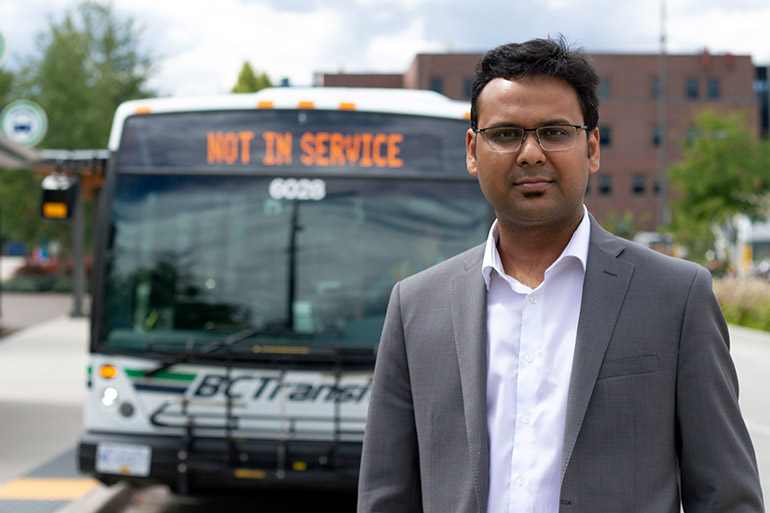
Assistant Professor Mahmudur Fatmi wants to hear how COVID-19 has impacted people's travel, whether it's running errands, going on a road trip or a cancelling that trip of a lifetime.
Online survey examines out-of-home and in-home activities
The COVID-19 outbreak has impacted everyone in Canada and around the world. While people are being asked to stay at home and maintain social distancing, a UBC Okanagan professor is collecting data about people's travel habits.
Assistant Professor Mahmudur Fatmi leads the Centre for Transportation and Land Use Research (CeTLUR) at UBC's Okanagan campus. His research includes travel behaviour analysis, transportation and land use interaction, urban system simulation, autonomous and shared mobility, activity-based modelling, and road safety. His research findings help to develop effective transportation and land use plans and policies, as well as assist in infrastructure investment decision making.
While travel has pretty much ground to a halt, Fatmi is examining how these unprecedented events impact individuals' daily and long-distance travel. For example, he is investigating how people have adjusted their out-of-home activities with in-home activities such as online shopping. He is also studying the purpose of travel such as to pick-up online orders and analyzing whether there is an increase in the usage of any travel mode such as cycling.
Fatmi's COVID -19 Survey for assessing Travel impact (COST) online survey collects information on how COVID-19 has affected participant's daily and long-distance travel decisions.
What is the goal of this study?
COVID-19 has significantly affected individuals' travel decisions around the world and little is known about this impact. The COST survey will collect information regarding the impact of COVID-19 travel restrictions on people daily (weekday and weekend) and their long-distance travel.
What are you hoping to learn?
The findings of this research will provide insights on how people have adapted their daily out-of-home activities such as work and shopping and switched to in-home activities such as work-from-home and online shopping. This study will also explore individuals' mental well-being after completing a task that involved travel and an in-home activity.
This study will also focus on long-distance travel, asking people about long-distance trips that were completed and those that were cancelled during this unusual time. The findings of this research will provide important behavioural insights regarding the travel adjustments people are making due to this pandemic, which is expected to assist in the development of policies to minimize disruptions due to such unprecedented scenarios.
For the most part, people have been staying at home in response to the outbreak. Can you explain what specific answers you are looking for?
This survey collects information regarding individuals' current out-of-home travel, and how it has changed due to COVID-19. It looks at how individuals are spending time by performing in-home activities, online ordering, travelling to pick-up online orders, among others. For example, the survey collects information about respondents' weekday travel such as why they are travelling, how frequently they are travelling and what travel mode they are using.
What are you going to do with this data?
The findings of this research will provide important behavioural insights on the changes in travel demand during the COVID-19 outbreak.
For example, this study offers insights into: what types of activities people are performing more frequently? What type of travel mode they are using more frequently?
This understanding will help policymakers identify priorities for minimizing disruptions due to the COVID-19 outbreak while developing policies and making infrastructure investment decisions.
How can people take part in this research?
People can take the survey here: engineering.ok.ubc.ca/surveys/cost
And they can learn more about the survey at: cetlur.ok.ubc.ca/surveys/cost
There is also information on Facebook and Twitter.
About UBC's Okanagan campus
UBC's Okanagan campus is an innovative hub for research and learning founded in 2005 in partnership with local Indigenous peoples, the Syilx Okanagan Nation, in whose territory the campus resides. As part of UBC-ranked among the world's top 20 public universities-the Okanagan campus combines a globally recognized UBC education with a tight-knit and entrepreneurial community that welcomes students and faculty from around the world in British Columbia's stunning Okanagan Valley.






